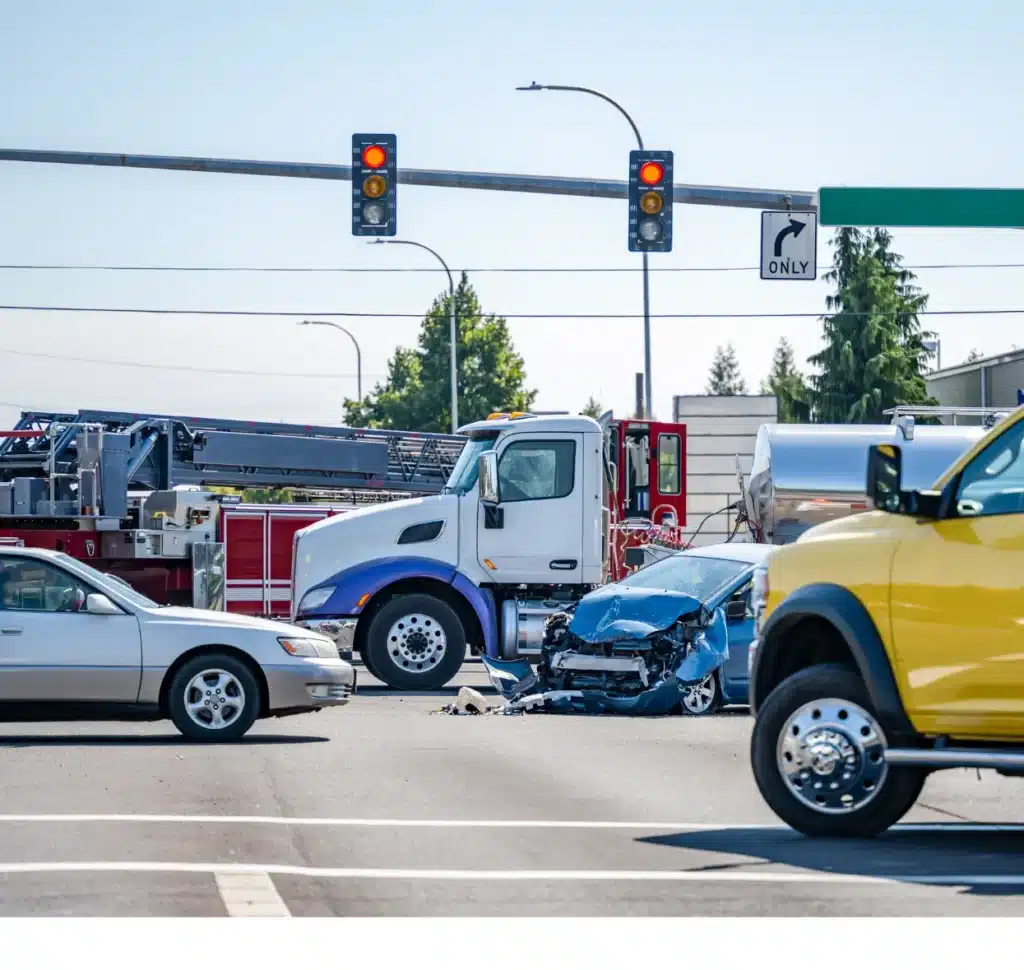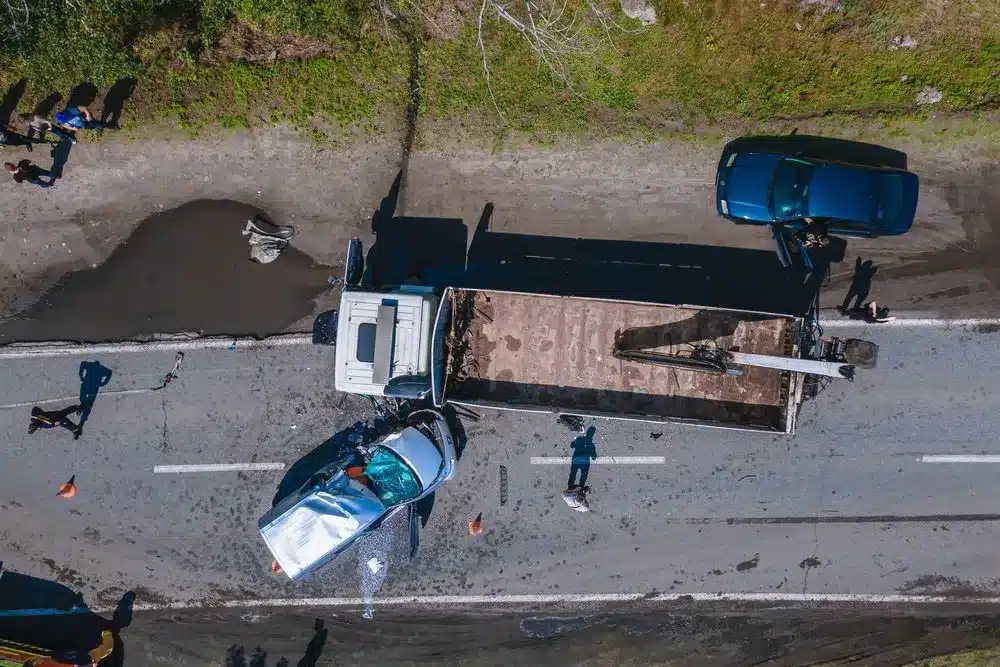
At Cesar Ornelas Injury Law, we understand how frustrating and stressful this can be. Our team is committed to fighting for your rights and ensuring you receive the compensation you deserve. We offer free consultations to discuss your case and explore your legal options. Don’t let the trucking company avoid paying for their negligence. Contact us today at 210-957-2103 for a free consultation, and let us help you navigate the complexities of your truck accident claim.
Steps to Take Immediately After a Truck Accident
After a truck accident, taking immediate steps to protect yourself and your potential claim is essential. Here is a list of actions you should consider:
- Call Emergency Services: Ensure medical assistance and law enforcement documentation. Even if injuries are not immediately apparent, seeking medical evaluation is crucial for proper treatment and legal documentation.
- Seek Medical Attention: This action safeguards your health and creates a critical medical record for your case.
- Gather Evidence: At the scene, photograph the vehicles, damages, and environment. Collect contact information from witnesses. Photographs can protect you from false accusations and provide visual proof of the accident’s circumstances.
- Use a Disposable Camera: Consider having one in your vehicle as a precaution, as it might be more legally credible than digital images.
- Stay Composed: Keeping calm after an accident allows you to make safer decisions and better manage the situation. This calm demeanor will also help when interacting with law enforcement and gathering necessary information.
By following these steps, you position yourself to effectively handle the aftermath of a truck accident and build a solid foundation for your truck accident claim. At Cesar Ornelas Injury Law, our skilled team is here to guide you through these essential steps, providing the legal support needed to strengthen your case. We are committed to helping you gather evidence, manage dealings with insurance companies, and secure the compensation you deserve.
Understanding Why Trucking Companies Deny Responsibility
Trucking companies often deny fault in accidents for several strategic reasons. First, they want to protect their finances by reducing liability and avoiding large payouts. By denying fault, they can try to shift the blame to others, such as the truck driver, the victim, or even external factors like weather or road conditions. They might also claim the truck driver was not working within their job duties at the accident’s time, trying to escape responsibility.
Another tactic is to question the evidence, disputing the accuracy of accident reports or the reliability of witnesses. They may also argue that the victim’s actions partly caused the accident, which could decrease their own liability. In some cases, trucking companies might insist that mechanical failures or defective parts, which they are not responsible for, led to the accident.
Defense lawyers are involved in this process, crafting responses and using tactics to challenge clear facts, keeping legal options open for the trucking company. This can be very discouraging for victims. However, understanding these common defenses can help accident victims and their lawyers prepare to counter them
What Are the Signs That a Trucking Company Is Attempting to Avoid Liability?

- Delayed Response: If the trucking company is slow to respond to your inquiries or claims, it might be a tactic to frustrate you into accepting a lower settlement.
- Shifting Blame: The company may attempt to blame the truck driver, road conditions, or even you, to deflect responsibility.
- Disputing Evidence: They might challenge the validity of accident reports, witness statements, or even your medical records to weaken your claim.
- Pressuring Quick Settlements: Offering a quick, low settlement is a common tactic to avoid larger payouts. They may pressure you to accept before the full extent of your damages is known.
- Lack of Cooperation: Refusing to provide requested documents or information can indicate they are trying to hide something.
- Hiring Aggressive Defense Lawyers: Engaging lawyers known for their aggressive tactics can be a sign that they plan to fight the claim vigorously.
- Questioning the Truck Driver’s Employment Status: Claiming the driver was an independent contractor or not on duty at the time of the accident can be a way to avoid responsibility.
- Claiming Mechanical Failure: Suggesting that a defect or maintenance issue caused the accident can shift blame away from the company’s operational practices.
Understanding these signs can help you and your truck accident lawyer build a strong case and ensure the trucking company is held accountable for their role in the accident.
Common Tactics Used by Insurance Companies
Insurance companies often use aggressive tactics to avoid responsibility for accident claims. Trucking insurance companies may try to place more blame on the claimants and are known for denying claims or offering low settlements. Some insurers might deny claims as a strategy to lower the compensation amount. They do this to avoid paying for accident-related damages, which can make the claims process more difficult.
Hiring a truck accident lawyer is essential because they are familiar with these tactics and will fight for your rights. Remember, a claim denial doesn’t mean the negotiation process is over; you can still pursue other options to get the compensation you deserve.
Potentially Liable Parties in a Truck Accident
Determining who is at fault in truck accidents requires identifying all parties that might be responsible, such as the truck driver, the trucking company, the cargo loader, or the truck manufacturer. Proving negligence in these cases involves a thorough investigation of various factors and parties involved. Understanding these potentially liable parties is critical for strengthening your truck accident claim.
The truck driver and trucking company are often the first to be considered responsible for an accident, depending on the specific circumstances. However, liability can also extend to manufacturers if a vehicle defect caused the accident, or to service providers if maintenance issues were involved. If a third party owns the truck, they might be liable if poor inspection or lack of maintenance is found to be a contributing factor.
The Truck Driver
A truck driver can be held responsible for accidents if they engage in negligent actions such as distracted driving or failing to properly inspect their vehicle. For instance, phone records can indicate if the driver was using their phone at the time of the accident. Additionally, driver training documents can show whether the driver was adequately trained to manage the truck.
Truck driver operations are regulated by both state and federal laws. A self-employed semi-truck driver or one working outside their employment scope can be fully liable for a truck accident. If you are hit by an independent contractor or owner-operator, you can seek compensation directly from that individual.
The Trucking Company

Additionally, if a trucking company knowingly allows unsafe trucks on the road or skips regular maintenance checks, they can be held accountable for any accidents that occur. Truck accident victims should know that trucking companies may use various tactics to avoid responsibility. Truck safety experts can provide evidence showing whether the company followed or broke regulations, which is key to proving the company’s responsibility for the accident.
The Cargo Loader
Cargo loaders have a crucial responsibility to ensure that all cargo is properly loaded and secured before transport. If the cargo is not loaded correctly, it can shift or fall, leading to accidents. In such cases, cargo loaders can be held responsible for any accidents caused by their negligence.
Their actions are closely examined to determine if they played a role in the accident, making cargo loaders potentially liable if the cargo was improperly loaded.
The Truck Manufacturer
When truck accidents happen due to faulty parts, the truck manufacturer can be held responsible. To prove the manufacturer’s liability, evidence must show that a defective part, like brakes or tires, caused or significantly contributed to the accident. Manufacturers are held to strict liability standards, meaning they are responsible for ensuring their products are safe and reliable. If a defect in a truck part leads to an accident, the manufacturer may be accountable for any resulting damages.
Can I Still File a Claim If I Was Partially Responsible in Texas?
In Texas, you can still file a truck accident claim even if you’re partly at fault. Texas uses a modified comparative negligence rule, which means you can seek compensation as long as you’re not more than 50% responsible for the accident. Your compensation will be reduced by your percentage of fault. For instance, if you’ve found 30% at fault, your compensation will decrease by that percentage.
Truck accident laws vary by state, affecting how claims are handled and what compensation you might receive. At Cesar Ornelas Injury Law, our experienced attorneys understand these differences and offer tailored legal guidance based on your location. We will examine your case, gather evidence, and advocate for you to minimize your fault percentage and maximize your financial recovery. Contact us today for a free consultation to discuss your options and learn how we can assist you in pursuing your truck accident claim, regardless of where the accident occurred.
Proving Fault in a Truck Accident Case
Proving fault in a truck accident case can be more complicated than in other car accidents. It involves a detailed investigation and collecting crucial evidence to support your claims. Creating an initial accident report helps gather important details about the incident, which is useful for legal proceedings. Keep copies of all documents and photos for future reference in case of disputes.
Multiple parties might be responsible for a truck accident, so it’s important to investigate each one’s role thoroughly. If proving negligence is challenging, you might need to file a lawsuit or request records through legal channels.
Collecting Evidence
Gathering as much evidence as possible at the scene is necessary to support your claim. Here’s a detailed list of the evidence you should aim to collect:
- Photographs and Videos: Capture images and videos of the accident scene, including all vehicles involved, any visible damages, road conditions, traffic signs, and skid marks. These visuals provide a clear depiction of the accident’s aftermath and can be pivotal in establishing fault.
- Witness Information: Obtain contact details and statements from any witnesses present at the scene. Their accounts can offer unbiased perspectives on how the accident occurred.
- Police Report: Ensure you receive a copy of the police report, as it contains essential details about the accident and statements from the parties involved. This official document is a critical piece of evidence.
- Driver Information: Collect information from the truck driver, including their name, contact details, driver’s license number, and insurance information. Also, note the trucking company’s name and contact information.
- Truck and Cargo Details: Record the truck’s license plate number, vehicle identification number (VIN), and details about the cargo being transported. This information can be crucial if the cargo contributed to the accident.
- Black Box Data: If possible, secure data from the truck’s black box, which records the vehicle’s speed, braking patterns, and other vital metrics before and during the accident.
- Traffic Camera Footage: Check for any nearby traffic cameras that may have captured the accident. This footage can provide an objective view of the incident.
- Medical Records: Document all medical attention received immediately after the accident and any ongoing treatments. These records are vital for substantiating injury claims.
- Maintenance and Inspection Logs: Obtain records of the truck’s maintenance and inspections to determine if any mechanical failures contributed to the accident.
- Driver Logs: Request the truck driver’s logs to verify compliance with hours-of-service regulations, which can indicate fatigue or other violations.
Collecting this evidence is vital for building a strong truck accident case. At Cesar Ornelas Injury Law, we help you gather and organize this information to reinforce your claim and ensure you receive the compensation you’re entitled to.
Expert Testimony

These experts provide valuable information that helps clarify how the accident happened and supports your claims. Including expert testimony is essential for building a strong case and can significantly influence the outcome of legal proceedings.
How to Handle Accusations from the Trucking Company
If the trucking company tries to blame you, don’t take it personally. Stay calm to manage the situation effectively. Trucking companies often use aggressive tactics to shift blame and reduce their responsibility.
Avoid making statements that could suggest you are at fault. Insurance adjusters may contact you soon after the accident to catch you off guard and use your words against you. Our truck accident lawyers can handle these interactions at Cesar Ornelas Injury Law. Our seasoned attorneys are familiar with these tactics and will protect your rights.
Accusations from the trucking company don’t determine the outcome of your case. They often claim innocence to protect themselves, but these claims don’t impact the final decision. Stay calm and rely on your lawyer to help counter these accusations and strengthen your claim.
Filing a Lawsuit After a Denied Truck Accident Claim
If your truck accident claim is denied, you still have the option to file a lawsuit:
- Collect Evidence: Gather important documents like the police report, photos from the accident scene, medical records, and witness statements. These will support your personal injury claim against the trucking company or their insurer.
- Consult a Truck Accident Lawyer: Get advice from an experienced truck accident lawyer. They will assess your case, guide you through the process, and provide strategic advice.
- File a Lawsuit: With your lawyer’s help, file a lawsuit within the legal deadline, usually two years from the accident date. This ensures you preserve your right to seek compensation.
- Prepare for Legal Proceedings: Work with your lawyer to prepare for court. This includes gathering more evidence, like data from the truck’s black box and expert testimonies, to strengthen your case.
- Negotiate with the Insurance Company: Your lawyer will negotiate with the insurance company to reach a fair settlement. If negotiations fail, the case may go to court.
By following these steps, you can effectively challenge a denied claim and pursue the compensation you deserve. At Cesar Ornales Injury Law, we can help you successfully navigate the complexities of filing a lawsuit.
The Importance of Hiring a Truck Accident Lawyer
Understanding the legal standards in the trucking industry can be complex, which is why having a truck accident lawyer is important. They have the experience to handle negotiations with trucking companies and their insurance companies, ensuring you are treated fairly. Truck accident lawyers help with filing insurance claims, resolving liability issues, and negotiating settlements.
A skilled truck accident attorney can speed up the settlement process, potentially leading to faster and higher compensation. Without legal help, victims may feel overwhelmed and may not receive anything if the insurance company denies their claim. A seasoned lawyer assesses damages like medical expenses, lost wages, and pain and suffering to ensure you get the right compensation.
Truck accident lawyers work to maximize your compensation by gathering strong evidence and negotiating effectively. They provide essential legal representation during negotiations and, if needed, at trial. Hiring a truck accident lawyer allows you to focus on your recovery while they handle the legal details.
How Cesar Ornelas Injury Law Can Help You
At Cesar Ornelas Injury Law, we focus on delivering personalized services that fit each client’s specific situation. Our skilled truck accident lawyers work hard to get the best results for your truck accident claim. We know the trucking industry well and handle tough legal issues to make sure you get fair compensation.
We emphasize clear communication and keep clients informed about their rights and the status of their cases. Our team is available around the clock, giving you legal support whenever you need it. Choose Cesar Ornelas Injury Law for your truck accident case and see the positive impact our team can make. Contact us for a free consultation at 210-957-2103. We’re here to fight for your rights and help you get the justice you deserve.
Additional Resources
What Are the Common Injuries Sustained in Truck Accidents?
How Fast Can a Semi-Truck Go?




